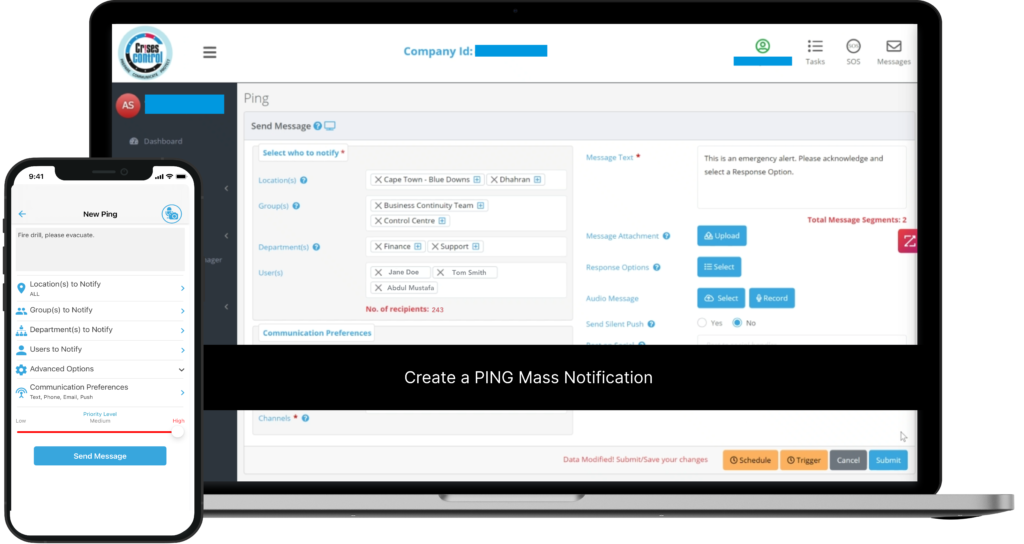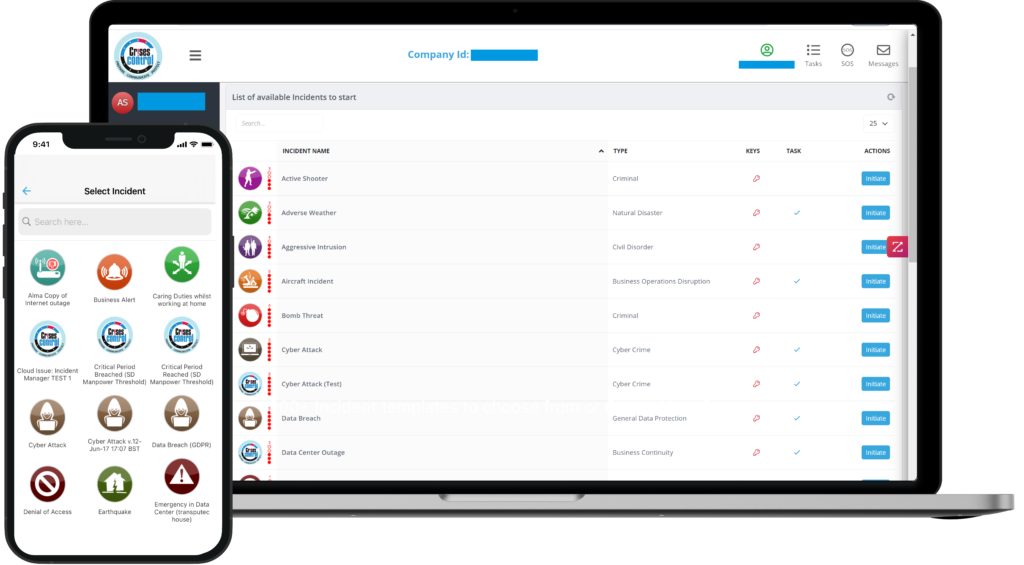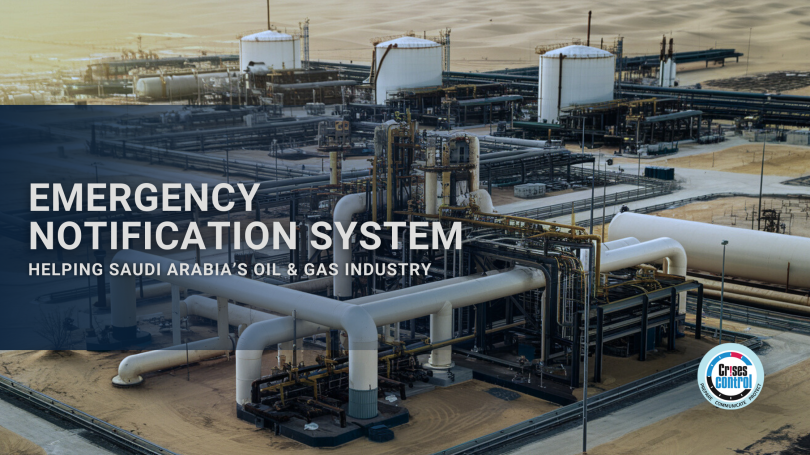Written by Anneri Fourie | Marketing Executive
The oil and gas industry is the backbone of Saudi Arabia’s economy and plays a key role in the global energy market. However, this critical sector faces a range of risks, from equipment failures and hazardous leaks to security threats and natural disasters. Given these challenges, having a robust Emergency Notification System is essential to managing risks, ensuring worker safety, and maintaining business continuity.
In this blog, we will explore the unique risks in Saudi Arabia’s oil and gas industry, how tailored emergency notification systems can mitigate these risks, and why Crises Control offers the ideal solution to protect your business.
Understanding the Risks in Saudi Arabia’s Oil and Gas Industry
The oil and gas industry is high-risk by nature, and in Saudi Arabia, these risks are compounded by operational, environmental, and geopolitical factors. Let’s look at some of the key challenges facing companies in this sector:
1. Equipment Failures and Operational Disruptions
The oil and gas industry relies on highly complex machinery to extract, process, and transport fuel. Mechanical failures or malfunctions in this equipment can cause major disruptions, accidents, or even explosions. For example, a faulty valve or pipeline could lead to production shutdowns or environmental contamination.
Emergency notification systems are crucial here. Quick, real-time communication can be the difference between containing an issue early and facing a full-scale disaster. Workers and safety teams need to be instantly notified so that they can take action, isolate the problem, and prevent further damage.
2. Hazardous Leaks and Environmental Threats
Oil spills and gas leaks can have devastating environmental and human health consequences. Whether it’s oil leaking into the sea from offshore platforms or gas escaping into the atmosphere, the impact can be severe, threatening marine life, local communities, and even the wider ecosystem.
The speed of response is critical when dealing with hazardous leaks. Emergency notification systems can rapidly alert employees and emergency teams, enabling swift evacuation, containment, and resolution. Tailored alerts can also guide personnel to safety while helping companies avoid costly fines and reputational damage.
3. Regional Security Threats
Saudi Arabia’s oil and gas infrastructure is a strategic asset and a potential target in the region. Threats from terrorist attacks, political unrest, or military action can disrupt operations and put lives at risk. Recent events have shown how easily energy infrastructure can become a target, and when it does, fast, clear communication is crucial.
A well-implemented emergency notification system (ENS) ensures that staff receive real-time updates about any threats. It also enables a coordinated response by delivering automated instructions to security teams and ensuring clear communication even during rapidly unfolding situations.
4. Natural Disasters
Though less frequent, natural disasters such as floods, sandstorms, and earthquakes can also pose serious risks to Saudi Arabia’s oil and gas operations. Offshore platforms are particularly vulnerable to sudden weather changes like storms or high winds, while desert-based facilities can be affected by sandstorms or extreme heat.
An effective ENS helps companies monitor weather patterns and issue early warnings, allowing them to take preventive action. This might include shutting down equipment, evacuating workers, or securing essential assets before the situation escalates.
How an Emergency Notification System Can Mitigate These Risks
Emergency notification systems are not just about sending alerts—they are about managing crises effectively and ensuring that people and processes respond in a coordinated, timely manner. Here’s how these systems can address the specific challenges in Saudi Arabia’s oil and gas industry:
1. Immediate Response to Equipment Failures
When critical machinery fails, every second counts. Delayed action can result in fires, explosions, or hazardous material releases. An advanced ENS can:
- Automatically trigger alerts to the relevant teams—such as maintenance, safety officers, and supervisors—immediately after a malfunction is detected.
- Use location-based notifications to alert staff in high-risk areas to take necessary precautions or evacuate.
- Facilitate seamless communication across teams to ensure rapid action and minimise the impact on operations.
2. Managing Hazardous Leaks Efficiently
During hazardous leaks, the safety of employees and the environment is at stake. A modern ENS allows companies to:
- Send real-time alerts to all personnel in affected areas, providing clear instructions on where to evacuate or how to handle the situation.
- Customise notifications based on the severity of the leak, ensuring that the response is proportionate and appropriate.
- Integrate with monitoring systems to detect leaks early and notify the right teams before the situation escalates.
3. Enhancing Security During Regional Threats
The geopolitical landscape of the Middle East can be unpredictable, and energy infrastructure is often a prime target during periods of unrest. An effective ENS helps oil and gas companies by:
- Providing real-time updates during security incidents, ensuring that staff are fully informed and can respond appropriately.
- Keeping communication channels open even when traditional lines are disrupted.
- Automating emergency instructions to key personnel responsible for securing facilities, allowing for a quick, organised response.
4. Proactive Weather Alerts
Offshore platforms and desert-based operations are highly vulnerable to sudden weather changes. With an ENS, companies can:
- Provide early weather alerts to remote facilities, giving them enough time to protect equipment, shut down operations, or evacuate staff.
- Ensure continuous communication with workers.
- Minimise disruptions by allowing teams to act on real-time information before adverse weather conditions worsen.
Interested in our Ping Mass Notification Software?
Efficiently alert everyone in seconds at scale with our Mass Notification System – PING, get the message out fast and ensure rapid response and recovery.

Customising an Emergency Notification System for Saudi Arabia’s Oil and Gas Sector
Not all Emergency Notification Systems are created equal, and the oil and gas industry has specific requirements. Here are key features that should be part of any emergency notification system in Saudi Arabia:
1. Multilingual Capabilities
Saudi Arabia’s oil and gas workforce is highly diverse, with employees from different linguistic backgrounds. It’s vital that emergency alerts are understood by all staff, regardless of their native language. An effective system should offer multilingual notifications, allowing workers to receive instructions in their preferred language. This ensures clarity and prevents confusion during a crisis.
2. Scalability for Remote Operations
Whether it’s offshore platforms, vast desert facilities, or refineries spread across large areas, the oil and gas sector operates in remote, often hard-to-reach locations. An Emergency Notification System must be scalable and capable of reaching workers wherever they are.
3. Customisable Alerts
Different types of emergencies require different responses. Whether it’s a minor equipment issue or a major hazardous leak, the system should allow companies to tailor alerts based on the severity and type of incident. This ensures that the right people receive the right information and can act accordingly.
4. Seamless Integration with Existing Systems
Oil and gas companies often use a range of operational systems and process control tools to monitor their infrastructure. An Emergency Notification System should integrate seamlessly with these systems, allowing for a smooth, coordinated response during emergencies. This ensures that information flows easily between all the relevant parties.
How Crises Control Can Help the Oil and Gas Industry in Saudi Arabia
At Crises Control, we understand the specific challenges faced by Saudi Arabia’s oil and gas sector, and our solutions are designed to meet these needs. Here’s how our platform can help:
Ping Mass Notification System
Our Ping Mass Notification System enables you to send instant alerts to your entire workforce, no matter where they are. With multilingual capabilities and customisable notifications, you can ensure that everyone receives clear, actionable instructions during an emergency.
Incident Manager Module
Our Incident Manager Module automates critical processes during emergencies, such as task assignment and progress tracking. This helps teams respond more efficiently, whether they’re dealing with an equipment failure or a security threat.
Task Manager
Crises Control’s Task Manager breaks down emergency plans into easy-to-follow steps. This ensures that everyone knows their role and responsibilities, reducing confusion and speeding up the response.
SOS Panic Button
For employees working in remote or high-risk areas, our SOS Panic Button feature allows them to alert emergency responders instantly if they’re in danger. This real-time capability can make a life-saving difference.
Cloud-Based Infrastructure
Our platform is fully cloud-based, meaning it remains operational even if local infrastructure is compromised. This ensures continuous communication during any crisis, from security threats to environmental disasters.

Interested in our Critical Event Management Software?
Customise your Critical Event Management Software to meet your specific needs with our flexible tools & stay connected and informed during the crisis and incident management process
Conclusion: Protect Your Business with Crises Control’s Emergency Notification System
Saudi Arabia’s oil and gas industry faces unique risks, but with the right emergency notification system in place, these challenges can be managed effectively. Crises Control offers a tailored solution that addresses the specific needs of this sector, helping companies mitigate risks, protect their workforce, and maintain operational continuity.
Don’t wait until an emergency strikes. Contact us today for a free personalised demo and discover how Crises Control can help safeguard your business.
Request a FREE Demo

